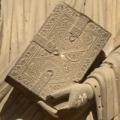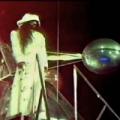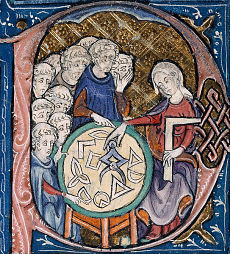226. Full of Potential: Thirteenth Century Physics
Richard Rufus and anonymous commentators on Aristotle explore the nature of motion, time, infinity and space.
Themes:
• E. Grant, Much Ado About Nothing: Theories of Space and Vacuum From the Middle Ages to the Scientific Revolution (Cambridge: 1981).
• A. Maier, Studien zur Naturphilosophie der Spätscholastik, 5 vols (Rome: 1949-55).
• C. Trifogli, Oxford Physics in the Thirteenth Century (ca. 1250-70): Motion, Infinity, Place and Time (Leiden: 2000).
• R. Wood, “Richard Rufus of Cornwall on Creation: the Reception of Aristotelian Physics in the West,” Medieval Philosophy and Theology 2 (1992), 1-30.
• R. Wood, “Richard Rufus of Cornwall and Aristotle’s Physics,” Franciscan Studies 52 (1992), 247-81.
• R. Wood, “Richard Rufus: Physics at Paris Before 1240,” Documenti e studi sulla tradizione filosofica medievale 5 (1994), 87-127.







Comments
Earth/Sun relationship. time.
AMDG
While we moderns claim the earth goes round the sun rather than the opposite, it is preferable to simply note that this is all a matter of reference with neither claim capable of standing on any absolute truth. Newton claimed an absolute quality to space to justify his Physics. The real difficulty is to find an absolute in Physics, which I contend has not and very likely will never be found. It seems all of Physics depends on an arbitrary reference.
As to time, consider if we can think about time without motion. A little thought brings one quickly to understand that motion is the physical attribute while time is an idea helpful in understanding motion.
Very informative post. I was
Very informative post. I was also taking an interest in Physics when I want to take some knowledge about physics. Physics is very important in our daily lives. physics tuition singapore
lifted ban
Hello, the episodes on metaphysics and physics and the overlaps between are some of my favorites and I always return to them... They're a home run!
In this one, you mention that the "ban" on actual infinity vs potential infinity is eventually "lifted"... When about is this? Is it covered in the Renaissance series?
Thank you for this work!
In reply to lifted ban by Austin
infinity ban
Well, there are debates about this in the late medieval/early modern period in both the Latin Christian and Islamic worlds. I think though that the real breakthrough comes in mathematics with developments connected with the invention of calculus, where they invent mathematical tools for handling the concept of infinity differently. So, maybe more like 17th century, though you would need to ask a historian of mathematics!
Richard Rufus reads Aristotle wrong?
When Richard Rufus criticizes Averroes for confusing time with the countable, that seems like a distortion of Aristotle's actual view. I was reading the relevant chapter of Aristotle's Physics just yesterday, and if I remember correctly Aristotle does say that number is the countable. If number is not the countable, I'm not sure how Aristotle's statement that time is number would have any meaning. Also, Aristotle states the possibility that time would not exist if soul did not exist, since there'd be nothing to count it, which again indicates the number is the countable. So is it fair to say that Richard Rufus is making a major departure from Aristotle?
In reply to Richard Rufus reads Aristotle wrong? by Zachary
The countable
Yes, nice point. This is actually a point of debate in scholarship on the discussion of time in Aristotle, because some passages suggest that time is a number (the number of motion or rest) independently of anyone numbering it. So the intuition here is that if the sun goes around the earth, that is a day whether or not anyone notices it or measures it. But other passages, like the one about soul, suggest that what is happening outside is only measureable as time, so that in a sense there is not really any time outside the mind. There is a good discussion of this in Sorabji's book on time in ancient philosophy. Also check out Ursula Coope's excellent book Time for Aristotle!
In reply to The countable by Peter Adamson
Time and Motion
I think it's telling the example you gave for why Aristotle might think time is real. According to Aristotle, motion and time go together, and he says that "time is neither movement nor independent of movement." So when the sun goes around the earth it is obvious that time has passed. But what if we imagine a universe that is empty? Or what about a universe where everything that exists is stationary? In both of these universes, if time is dependent on movement, no time can ever pass in either of these universes since there is no movement. So, since Aristotle says that time is dependent on motion, if time is also supposed to be real it would seem that time would be impossible in these universes. On the other hand, if Aristotle is not really committed to the reality of time independent of our perceptions then he would have no problem, and his view would seem much more reasonable.
In reply to Time and Motion by Zachary
Time and motion
Well, for him time measures motion or potential motion. So I think that Aristotle is in fact committed to the consequence (which I think we can assume he never considered explicitly as such) that in an empty universe time would not pass: nothing is moving, or potentially moving.
The universe where everything is at rest is a different case, since there we have lots of things that are (arguably) potentially moving. He actually does consider that kind of case, when he argues that things could not all be at rest and then start to move, here attacking Prosocratic views that would consider this possible. He does not say anything about whether time would pass in such a case, though: his argument is simply that motion could not just start without a prior motion to cause this purportedly first motion.
Add new comment